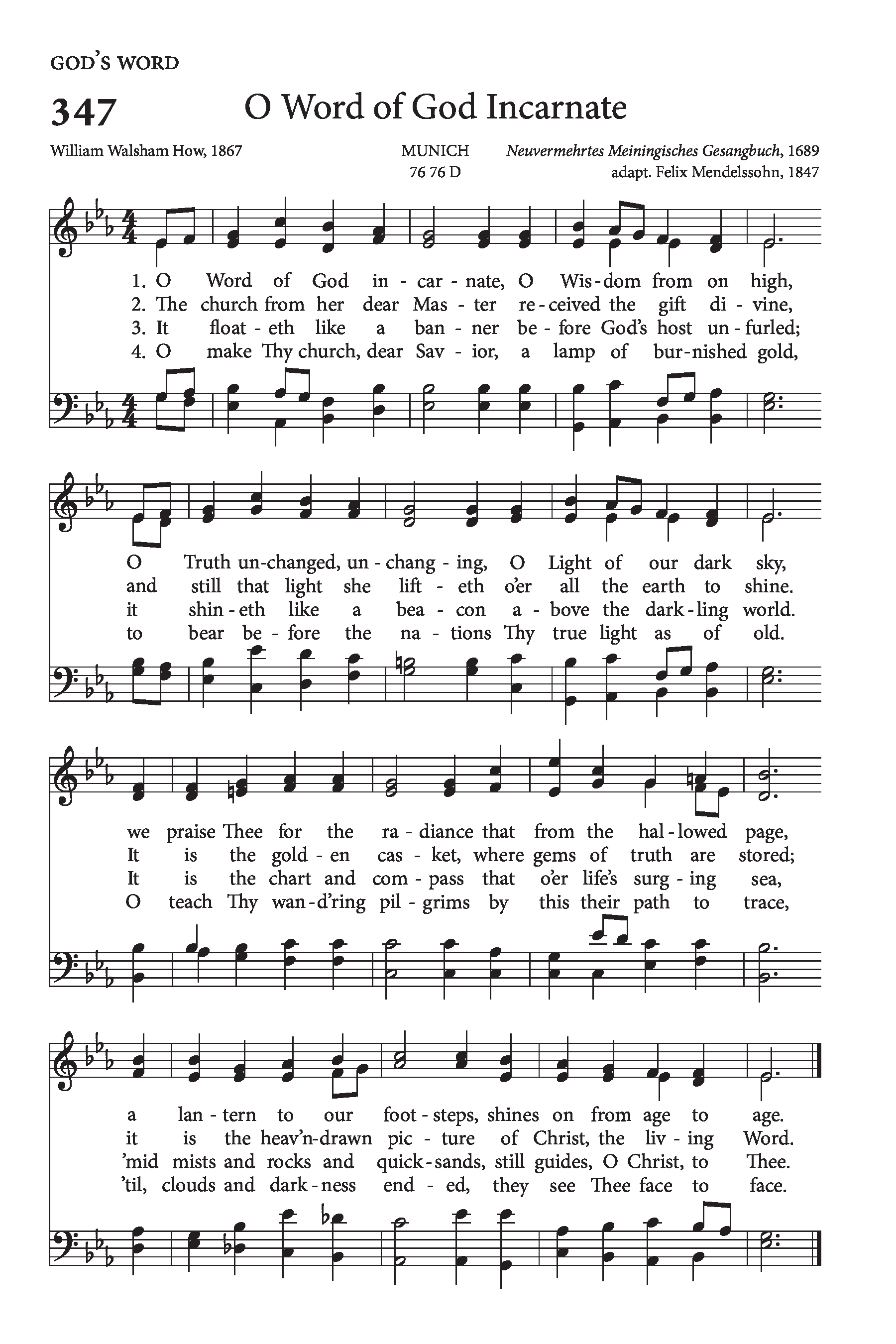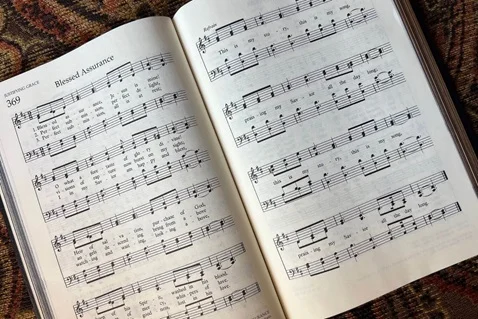O Word of God Incarnate
By William Walsham How
Lyrics
O Wisdom from on high,
O Truth, unchanged, unchanging,
O Light of our dark sky,
we praise Thee for the radiance
that from the hallowed page,
a lantern to our footsteps,
shines on from age to age.
received the gift divine,
and still that light she lifteth
o'er all the earth to shine.
It is the golden casket,
where gems of truth are stored;
it is the heav'n-drawn picture
Of Christ, the living Word.
before God's host unfurled;
it shineth like a beacon
above the darkling world.
It is the chart and compass
that o'er life's surging sea,
'mid mists and rocks and quicksands,
still guides, O Christ, to Thee.
a lamp of burnished gold,
to bear before the nations
Thy true light as of old.
O teach Thy wand'ring pilgrims
by this, their path to trace,
'til, clouds and darkness ended,
they see Thee face to face.
Bible Reference
Psalm 119:105
About This Hymn
Author – William W. How, 1823–1897
Composer – Melody from the Meiningen Gesangbuch (1693), harmonized by Felix Mendelssohn, 1809–1847
Tune Name – Munich
Meter – 76.76 Doubled
Scripture Reference – Psalm 119:105
Key Verse – All Scripture is given by inspiration of God, and is profitable for doctrine, for reproof, for correction, for instruction in righteousness: that the man of God may be perfect, thoroughly furnished unto all good works. – 2 Timothy 3:16–17
“O Word of God Incarnate” is one of the enduring hymns written by William Walsham How, an Anglican bishop and respected hymn writer of the nineteenth century. Born on December 13, 1823, in Shrewsbury, England, How became known not only for his theological contributions but also for his compassionate ministry among the poor. As the Bishop of the East End of London—a densely populated, impoverished section of the city—he earned the affectionate title “the poor man’s bishop.” Unlike many in his position, How chose to live simply, taking public transportation and immersing himself in the daily lives of those he served. His humility and devotion to Christian service left a lasting impression both within and beyond the Church of England.
Over the course of his life, How wrote around sixty hymns, with approximately twenty-five still in use today. He also co-edited a well-known Anglican hymnal alongside his friend Sir Arthur Sullivan, the celebrated composer of many popular operettas. Among his best-known hymns is “For All the Saints,” a stirring tribute to the communion of believers through the ages. Yet “O Word of God Incarnate” also stands as a rich expression of How’s faith and theological convictions. It first appeared in the 1867 supplement to Psalms and Hymns, edited by T. B. Morrell and How himself.
The melody to which this hymn is sung, Munich, is named after the German city and originates from a 1693 German hymnal known as the Meiningen Gesangbuch. The harmonization was later provided by the renowned composer Felix Mendelssohn, who also used the melody in his famous oratorio Elijah, specifically in the chorus “Cast Thy Burden on the Lord,” which debuted in England in 1846.
The hymn’s text is a poetic meditation on the central place of Scripture in the life of the believer and the Church. In the opening verse, Bishop How firmly affirms the Bible as the divinely inspired Word of God. In the second stanza, he acknowledges the Church as the appointed steward through which the Scriptures have been preserved and proclaimed throughout history. The third verse offers a series of rich metaphors—Scripture as a banner, lighthouse, chart, and compass—all highlighting its guidance and relevance for daily life. The fourth and final stanza is a prayer that the Church might remain a faithful guardian of God’s Word, leading souls toward eternal truth and salvation.
The hymn reflects a deep reverence for the Bible, a sentiment shared by many prominent figures across history. Abraham Lincoln once said, “Read this book for what on reason you can accept and take the rest on faith, and you will live and die a better man.” Such respect for Scripture is echoed in various reflections that highlight its enduring truth and transformative power.
Martin Luther, the great Reformer, wrote these memorable lines:
For feelings come and feelings go,
And feelings are deceiving;
My warrant is the Word of God,
Naught else is worth believing.Though all my heart should feel condemned
For want of some sweet token,
There is One greater than my heart
Whose Word cannot be broken.I’ll trust in God’s unchanging Word
Till soul and body sever:
For, though all things shall pass away,
His Word shall stand forever.
Likewise, the famed Scottish novelist and poet Sir Walter Scott penned this tribute to Scripture:
Within this ample volume lies
The mystery of mysteries.
Happiest they of human race
To whom their God has given grace
To read, to fear, to hope, to pray,
To lift the latch, to force the way;
But better had they ne’er been born
That read to doubt or read to scorn.
An anonymous poet also encouraged deep and reverent study of the Bible with these words:
Study it carefully, think of it prayerfully,
Till in thy heart its precepts dwell.
Slight not its history, ponder its mystery;
None can e’er prize it too fondly or well.
In “O Word of God Incarnate,” William W. How leaves us with a hymn that not only honors the sacredness of Scripture but also challenges the Church to remain a faithful witness to the truth it contains. Through its strong doctrinal foundation and poetic expression, the hymn continues to inspire reverence for God’s Word in congregations around the world.


📬 Subscribe to Our Devotional Updates
Receive weekly hymns, devotionals, and website features directly in your inbox.
Hymn Information

- Category: Hymn
- Author/Writer: William Walsham How (1867)
- Added: July 4, 2025
- Last Updated: July 4, 2025
- Views: 744
MIDI File
More Hymns by William Walsham How
Recent Blog Posts
-

-
 The Meaning of the Hymn “Blessed Assurance”
The Meaning of the Hymn “Blessed Assurance”
Dec 15, 2025 -
 The Real Inner Peace That Jesus Gives
The Real Inner Peace That Jesus Gives
Dec 15, 2025 -
 The Origins of the Christmas Tree
The Origins of the Christmas Tree
Dec 14, 2025 -

Visit Us on Social Media
Latest from X (Twitter)
Tweets by HymnalLibraryLatest from Facebook
Latest on YouTube
Daily Bible Verse
Disclaimer
The hymns, sheet music, MIDI files, and related content on this website are provided for educational and research purposes only.
- Public Domain: Many of the hymns featured here are in the public domain and may be freely used.
- Copyrighted Works: Some hymns may still be under copyright protection. Where applicable, permission has either been requested from the copyright owner, or the content is shared under the principles of fair use for educational purposes.
⚠️ Important Notice: If you wish to reproduce, distribute, or use any copyrighted hymn beyond personal study or educational use, you must obtain permission directly from the copyright holder. This website does not grant any rights for commercial use yet.
If there is any other question please address it to us in our Contact Page, for further assistance. Thank you for using the site. May God Bless You.